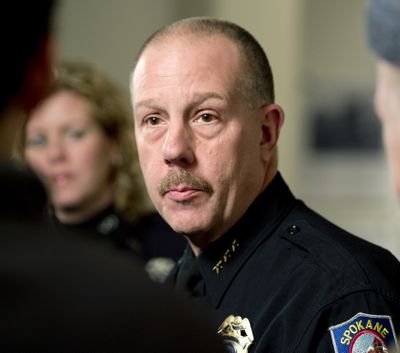Police face reorganization
Chief underlines core goal: reducing crime

The Spokane Police Department, hoping to restore public confidence, will embark on a major reorganization next month designed to make existing resources more efficient at achieving the ultimate goal of reducing crime.
The reorganization is contained within the department’s new strategic plan unveiled Friday by police Chief Frank Straub, and it comes just a day after an independent panel examining the use of force by Spokane police officers recommended 26 major changes in the department’s training and internal investigations.
Some of the Use of Force Commission’s recommendations, including revamping the policies and procedures and seeking accreditation, already appear in Straub’s plan.
“The department has been somewhat distracted by what to do in the aftermath of the Zehm … incident,” Straub said. “If we are going to restore confidence in our police department … we have to stay focused on our core mission, which is to reduce crime.”
The chief was hired last summer by Mayor David Condon to take over a department highly criticized by federal officials for what they called an extensive cover-up of the investigation into the 2006 beating of unarmed janitor Otto Zehm. He died two days after he was struck with a baton, shocked with a Taser and hogtied by several officers.
Former Officer Karl F. Thompson Jr. was sentenced in November to 51 months in prison for using excessive force and lying to investigators. Condon said his highest priority was to restore public trust in the department following the revelations from that investigation.
To achieve that goal, Straub said he wants to add an additional sergeant to help beef up the department’s Internal Affairs unit, revamp training and equip officers with body cameras.
However, Straub conceded that many of the changes he wants to bring will require the city to hire more police officers and spend more money to purchase things such as upgraded computer-aided dispatch, criminal analysis computers and software to operate the body cameras.
Condon announced Thursday that he expects by August to seek a tax increase that would help pay for those changes, as well as upgrades at the Spokane Fire Department and for programs designed to make the entire criminal justice system more efficient.
“The reality is that the chief and I are committed to having the safest city in the region,” Condon said. “We want to lay the groundwork for that strategy going forward.”
Straub said he’s open to incorporating recommendations suggested by the Use of Force Commission, saying his strategic plan is flexible by design and will change as the department faces challenges presented by smaller budgets and new crime trends.
Among the changes Straub announced are an increase of officers in downtown Spokane from two to nine, including supervisors; Maj. Craig Meidl is being promoted to assistant chief; and several of the department functions will be streamlined to allow officers to react more quickly to information obtained from the street.
Former Assistant Chief Scott Stephens, who served as interim chief until Straub arrived, is moving to captain. Despite the demotion, Straub lauded Stephens’ experience and institutional knowledge in his new role of seeking accreditation and heading up efforts to update policies and procedures.
“In the past, the Spokane Police Department has relied on a traditional, vertical organizational structure, with separate bureaus designed around specific functions,” the new plan explains. “In reality, however, most police work takes place laterally, moving across different units that are serving a common purpose. By reorganizing the department into a flatter, more horizontal and connected organization, we can match units to their function.”
Patrol and investigations, for example, will be a part of a new Field Operations Bureau overseen by Capt. Brad Arleth. The Strategic and Tactical Operations Bureau, led by Capt. Frank Scalise, will be in charge of all targeted crime units such as drug investigations, property crimes and neighborhood resources.
Another key change will come with Straub shifting budgeting, accounting and human resources functions to civilians to allow commissioned officers to continue to fight crime instead of researching such things as carpet cleaning contracts.
“Every day we have to get up and say, ‘How do we provide our services better?’ ” he said.
As the structure changes, Straub said he also wants to develop a training program to ensure that the next chief will never again have to come from outside Spokane.
“We have to recruit the best and train and develop an exceptional group of employees,” he said.
Straub said he hopes to reduce property crime by working with neighborhood organizations and even city code enforcement officers to identify problem areas, such as abandoned homes frequented by criminals.
Another focus will be to find chop shops and pawn shops where thieves are fencing stolen auto parts or property from car prowling and burglaries.
“We have been chasing burglars around the city,” he said. “When you show up to sell your stolen property, we will be waiting for you. If they have no place to sell it, there will be less incentive to steal it.”
Straub compared his strategy to attack property crime with that of fighting cancer.
“You find the disease and either cut it out or irradiate it,” he said. “Then you look at where the cancer has spread. Then, you strengthen the body so it doesn’t spread any more. We need to build stable neighborhoods so they can’t come back in.”